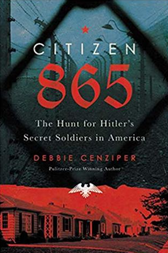A WRITER'S WIT |

Cenziper focuses her book on two main groups. First, she tells the story of Polish Jews who, during World War II, become Hitler’s pawns. Hitler is looking to expand Germany’s borders so that his people have more space in which to live, so he annexes Poland. After the war, some of these displaced persons flee to the US, for they have no one or nothing left at home. The other group Cenziper develops is the people who work for the Office of Special Investigations (OSI), one of whom is a fresh new historian, Peter Black. Historians are relentless researchers, so they make a good team along with others, lawyers, in particular.
Their work is to ferret out particular ex-Nazi’s, particularly “Citizen 856,” who later minimize their involvement with killing Jews to US Immigration officials, and thus gain illegal entry into the country—a frightening idea to the legal immigrants living nearly side-by-side their torturers in some cases. The OSI spends decades building cases against this group of Ukrainians and Russians who are recruited and rewarded by the Nazis for carrying out their orders to exterminate about 1.7 people. The OSI’s work is arduous and their results are mixed. Because most of the accused Nazis appeal the decision to be returned to their native countries to face trial there (except in Germany, where officials do NOT want these people back), some of them die before deportation, but a few do have to face justice in their home countries.
Some Americans, like Pat Buchanan, oppose the OSI’s work, want to dispose of the OSI. They believe those mass murderers should be forgiven and forgotten. It is difficult to see how these usually conservative people, can form such a free-and-easy view of what should happen to war criminals—when otherwise they are usually such hawks. Is that really a Christian posture? Maybe someone will write a book about them to figure out why they would hold such a position.



 RSS Feed
RSS Feed